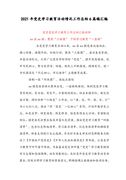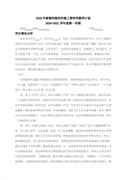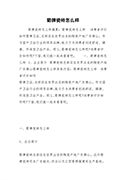【简介】感谢网友“花吃了那狗”参与投稿,下面是小编帮大家整理的雅思听力选择题有什么解题技巧(共5篇),希望对大家的学习与工作有所帮助。
篇1:雅思听力选择题有什么解题技巧
雅思听力选择题有什么解题技巧
雅思听力技巧之听力题目预读
因为听力选择题选项多,不提前看题目等到听力录音开始再看,听力语速一旦快了,很容易听漏。所以,正确的听力选择题做题顺序是,先看题目,找到定位关键词知道要考什么,这样在听原文时能够有所侧重,否则考生很有可能遗漏关键信息,错选答案。在预读题目的时考生可以划出时间、地点、人名、事物这类关键词。
以剑雅8Test2 Section321-24题为例:根据题目,我们可以定位这几题的关键词分别为“Australia/Asian honey”,“problem/Asian honey”,“Australian bees”,“Grant Freeman/Asian honey/Australia”,定位到这几个关键词,可以让考生知道重点需要听哪些内容,删选不必要信息,提高答题效率。
雅思听力技巧之比较选项异同
…… 此处隐藏23833字 ……
Diasporas spread money, too. Migrants into rich countries not only send cash to their families; they also help companies in their host country operate in their home country. A Harvard Business School study shows that American companies that employ lots of ethnic Chinese people find it much easier to set up in China without a joint venture with a local firm.
Such arguments are unlikely to make much headway against hostility towards immigrants in rich countries. Fury against foreigners is usually based on two (mutually incompatible) notions: that because so many migrants claim welfare they are a drain on the public purse; and that because they are prepared to work harder for less pay they will depress the wages of those at the bottom of the pile.
The first is usually not true (in Britain, for instance, immigrants claim benefits less than indigenous people do), and the second is hard to establish either way. Some studies do indeed suggest that competition from unskilled immigrants depresses the wages of unskilled locals. But others find this effect to be small or non-existent.
Nor is it possible to establish the impact of migration on overall growth. The sums are simply too difficult. Yet there are good reasons for believing that it is likely to be positive. Migrants tend to be hard-working and innovative. That spurs productivity and company formation. A recent study carried out by Duke University showed that, while immigrants make up an eighth of America's population, they founded a quarter of the country's technology and engineering firms. And, by linking the West with emerging markets, diasporas help rich countries to plug into fast-growing economies.
Rich countries are thus likely to benefit from looser immigration policy; and fears that poor countries will suffer as a result of a “brain drain” are overblown. The prospect of working abroad spurs more people to acquire valuable skills, and not all subsequently emigrate. Skilled migrants send money home, and they often return to set up new businesses. One study found that unless they lose more than 20% of their university graduates, the brain drain makes poor countries richer.
Indian takeaways
Government as well as business gains from the spread of ideas through diasporas. Foreign-educated Indians, including the prime minister, Manmohan Singh (Oxford and Cambridge) and his sidekick Montek Ahluwalia (Oxford), played a big role in bringing economic reform to India in the early 1990s. Some 500,000 Chinese people have studied abroad and returned, mostly in the past decade; they dominate the think-tanks that advise the government, and are moving up the ranks of the Communist Party. Cheng Li of the Brookings Institution, an American think-tank, predicts that they will be 15-17% of its Central Committee next year, up from 6% in 2002. Few sea turtles call openly for democracy. But they have seen how it works in practice, and they know that many countries that practise it are richer, cleaner and more stable than China.
As for the old world, its desire to close its borders is understandable but dangerous. Migration brings youth to ageing countries, and allows ideas to circulate in millions of mobile minds. That is good both for those who arrive with suitcases and dreams and for those who should welcome them.









